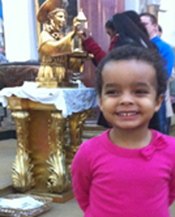 May I take gentle issue with the view expressed by Daniel Kearney in his blog of 2 January that “kids don’t get prayer’? The innocence of children, we are led to believe, reaches directly to heaven, while adult piety, which may win some but certainly loses many of the battles with the ego, usually takes a more circuitous route. Perhaps we should look more closely at what happens before the little ones are claimed by the world and seemingly lost to faith and reason. Is there an early receptivity to the divine that we can nourish, strengthening them for the materialist onslaughts ahead?
May I take gentle issue with the view expressed by Daniel Kearney in his blog of 2 January that “kids don’t get prayer’? The innocence of children, we are led to believe, reaches directly to heaven, while adult piety, which may win some but certainly loses many of the battles with the ego, usually takes a more circuitous route. Perhaps we should look more closely at what happens before the little ones are claimed by the world and seemingly lost to faith and reason. Is there an early receptivity to the divine that we can nourish, strengthening them for the materialist onslaughts ahead?
Certainly, without abandoning the guiding role of father and mother, we can learn from our children. Taking my three-year-old daughter to Mass has been a revelation in very different ways, for her and her parents. Without verbalising much, she shows an appreciation of ritual, and is keen to participate at what she has learned is the right moment.
She is always ready to put her coins in the collection; she shakes the hand, rather seriously, of all her neighbours at the Sign of Peace; she puts her hands together for the Lord’s Prayer – when she was holding her teddy, she folded her own hands round the teddy’s hands so that the bear prayed too - and when it is time to approach for communion, she takes the hand of a Spanish girl her own age, who she only knows from Mass, and the two little ones approach the priest hand in hand. On the way, she shakes the proffered hand of an old lady who is always in the same place in her wheelchair.
Each time, on reaching the priest, she clearly expects to receive, but is not disconcerted when she receives her blessing.
After Mass, she greets the blind man who leads our singing and the French horn player who accompanies him. She greets the blind man’s dog, and admires the instrument whose blasts she recalls from the service.
We light candles and she associates this with prayer: we say thank you to Jesus for all the good things we enjoy; and we petition on behalf of those who might need help. She appears comfortable with addressing someone who I assume she cannot see; and she refers to the various images of the baby in Mary’s arms and Christ on the Cross as Jesus.
Does she have a sense of the holy? I wouldn’t rule it out. The everyday world for her is full of phenomena from the exciting and spectacular to the intriguing and occasionally worrying. She has her three-year-old’s powerful emotional responses to all of this, and it is thoroughly absorbing, or less so. But she knows that Mass is a different kind of occasion. I think she perceives and imitates reverence, so that the groundwork is laid for the later grasp of the concept.
Ann-Marie has few, if any, words to describe what is going on in the Mass, but would it be right to say she has no appreciation of what is happening? I don’t think so. The liturgy lifts us towards a mystery beyond our understanding. Is it too fanciful to say that as adults we are also led, in some way, to a remembering?


 Loading ...
Loading ...
What do you think?
You can post as a subscriber user ...
User comments (0)